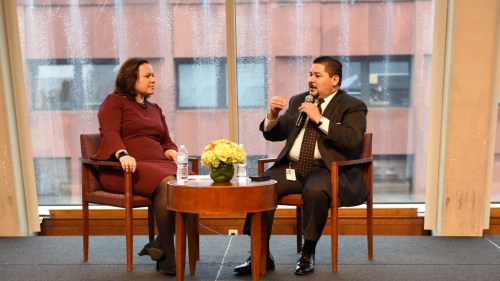
Lisette Nieves interviewing RIchard Carranza, chancellor of the New York City Department of Education
Richard Carranza, chancellor of the New York City Department of Education (DOE), was the guest speaker at NYU Steinhardt’s Leadership Lens Series. In a conversation with Lisette Nieves, the chancellor answered questions that ranged from information about the songs on his playlist (“mostly Mariachi”), to what he likes to see in a classroom (“curiosity and inspiration, rather than law and order“).
Appointed by New York City Mayor Bill de Blasio last March, Carranza leads the nation’s largest school district of 1.1 million students in 1,800 schools. (Previously he served as the superintendent of the Houston Independent School District; before that, the San Francisco schools.)
The son of working class parents – his father was a sheet-metal worker and his mother, a hairdresser — Carranza understood early on that education was a family value. This knowledge was cemented in the person of his kindergarten teacher, “the biggest, most beautiful woman,” he had ever seen, who taught the non-native speaker English.
Carranza added that his first teacher created “a well-rounded social emotional learning environment” that was supported by parents who trusted that the public school would teach their children English and prepare them for college. He added, “That is why I am an unapologetic, unvarnished, vociferous, absolute defender of the public schools. Public schools are the cornerstone of our democracy.”
Nieves, a clinical professor of educational leadership and policy studies in the Department of Administration, Leadership, and Technology, asked Carranza about initiatives fostering educational equity. Carranza noted that the Department of Education is committed to challenging the racial and economic disparities inherent in New York City’s gifted and talented programs and specialized high schools. The DOE will also be addressing educational equity by bringing technology into schools so that a teacher with subject matter expertise can offer a course remotely to students when no teacher is available in the physical classroom.
Drawing on his experience as a student, teacher, and principal, Carranza offered the audience three elements that essential to academic success. He said students need to have a home environment where parents support education; a nurturing environment in school; and a teacher who can see their potential.
“At the start of the school year, my teacher thought I was smarter than I was; and so I was,” he said.
